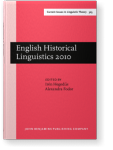The demise of gog and cock and their phraseologies in dramatic discourse
A study into historical pragmatics of tabooistic distortions
The use of linguistic forms derived from the lexicon denoting sacred entities is often subject to tabooing behaviour. In the 15th and 16th century phrases like by gogges swete body or by cockes bones allowed speakers to address God without really saying the name; cf. Hock (1991: 295). The religious interjections based on the phonetically corrupt gog and cock are evidenced to have gained currency in the 16th century. In the 17th century all interjections based on religious appellations ceased to appear on stage in accordance with the regulations of the Act to Restrain Abuses of Players and never returned to stage. While, with the loosening grip of censorship, God and Gad interjections are abundant in the drama texts of the 18th and 19th centuries. The present article attempts to explain the reasons for the disappearance of gog and cock interjections in the course of the 17th century. Additionally, the article contains remarks on the socio-pragmatics of gog and cock and their phraseological productivity.
